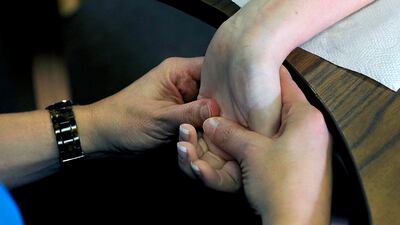ABU DHABI // Children suffering from juvenile arthritis are being diagnosed months or even a year after showing initial symptoms, leading to long term disability that should have been preventable.
A lack of awareness among medics and a significant shortage of specialist paediatric rheumatologists is among the reasons behind the delay, a new study carried out at Mafraq Hospital in Abu Dhabi found.
In many cases disability has set in before treatment starts.
Researchers followed 66 patients, half Emirati and half expat, who eventually sought treatment at Al Mafraq Hospital, which has a paediatric rheumatologist.
They traced back how long patients had symptoms and how long it took before a doctor in others clinics and surgeries identified the condition. For Emiratis it was nine months and for expats more than 12 months.
Dr Khulood Khawaja, paediatric rheumatologist at Mafraq Hospital, said she has seen children with hands completely destroyed, knees damaged, some in wheelchairs and suffering multiple joint disability due to delay in getting help.
Juvenile idiopathic arthritis, the formal name for the condition, is a chronic inflammatory disease that affects 1 in 1000 children worldwide, though the cause it not known.
"Most people don't believe children can get arthritis. There is a significant delay in referrals and this is what causes problem in outcome," Dr Khawaja said.
"If we get the child early, then treatments are available in the UAE. The problem is getting the child referred to us without delay."
Dr Khawaja believes it is not just a lack of specialists but a lack of awareness, including among GPs and others.
Diagnosing the problem in pre-school children is difficult though, she said.
"At a pre-school age, children can have an affected knee and they think it is normal and just walk with a limp. They have pain but it takes them a long time to complain as they think it's normal. It can also affect the eyes. This can be completely silent but vision might be affected," said Dr Khawaja.
The doctor has seen seen many children with either partial or complete loss of vision in an eye because there was a delay in diagnosis.
Paediatric rheumatologists are highly specialised and there thought to be just one in Abu Dhabi, two in Dubai and a paediatrician with knowledge of rheumatology in Al Ain.
At present, there are more than 100 children seeking treatment for arthritis at Al Mafraq Hospital itself.
There must be more knowledge of the condition GPs, parents and teachers, who are often the first to identify cases, said Dr Khawaja.
"In this day and age you should not have disability secondary to arthritis as there are treatments," she said.
"Musculoskeletal examination is required to screen children but musculoskeletal is not considered important in medical school. The system is not taught well even in England or America," said Dr Khawaja.
Developing postgraduate courses for family doctors, pediatricians, emergency doctors and orthopedic surgeons would potentially improve access to care and reduce delay in referrals, concluded the study.
Dr Betina Rogalski, a specialist paediatric rheumatologist at Mediclinic City Hospital in Dubai, believes it's important that people know there are children with arthritis and with rheumatic diseases and they can be treated.
"The earlier you pick the problem and start treatment the better the outcome is," she said.
The doctor, who is based in Germany and flies to UAE every six weeks, said doctors often misdiagnose the condition.
"I do see wrong diagnosis and surgeries on children with arthritis that were completely unnecessary. I see delay but it is not as bad as it used to be,” said Dr Rogalski.
In her experience, she said diagnosis is not as delayed as Mafraq hospital reported, but in some cases is three to four months.


